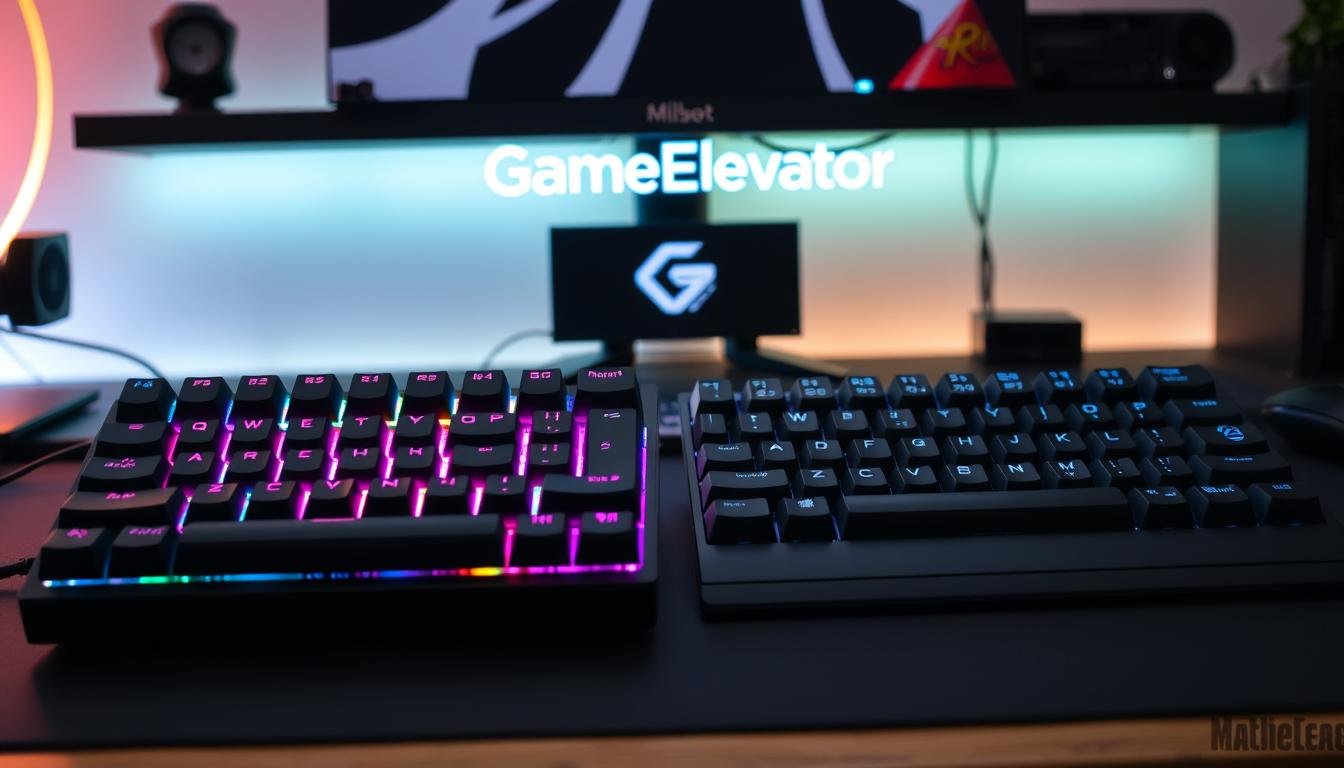A silent revolution is happening in keyboards. More people are choosing mechanical keyboards over the usual membrane ones. Mechanical keyboards vs membrane keyboards is a debate worth exploring. But what makes them different, and which one is better for you? We’ll explore the world of keyboard technology together, looking at the key differences and what each offers. This guide will help you choose the right keyboard, whether you type a lot, play games, or just want a better typing experience.
Key Takeaways
- Mechanical keyboards offer a more tactile and responsive typing experience compared to membrane keyboards.
- Mechanical keyboards are known for their durability, with a lifespan of up to 50 million keystrokes per switch.
- Membrane keyboards are generally more affordable and quieter, but they may not provide the same level of precision and feedback as mechanical keyboards.
- Mechanical keyboards offer a wide range of customization options, including different switch types, keycaps, and backlighting.
- The choice between mechanical and membrane keyboards ultimately depends on your personal preferences, needs, and budget.
Understanding the Basics of Keyboard Technology
There are two main types of keyboards: membrane and mechanical. Knowing the difference between them is key to finding the right one for you.
Membrane vs Mechanical: An Overview
Membrane keyboards have a thin, flexible layer under the keys. Pressing a key compresses this layer, registering the input. They are cheaper and quieter to type on.
On the other hand, mechanical keyboards have individual switches under each key. These switches give a tactile and audible feedback, making typing more satisfying. They are loved by many for their durability and customization.
Key Components and Their Functions
Let’s dive into the parts that make membrane and mechanical keyboards different:
- Keycaps: The keys you see and press.
- Switches: What registers a key press and sends it to the computer. Membrane keyboards use rubber domes, while mechanical keyboards have individual switches.
- Actuation Force: The pressure needed to press a key. Mechanical keyboards require more force, making typing more tactile and responsive.
- Travel Distance: How far a key moves when pressed. Mechanical keyboards have a longer travel distance, which some find more comfortable.
Knowing these parts helps you choose between membrane and mechanical keyboards.
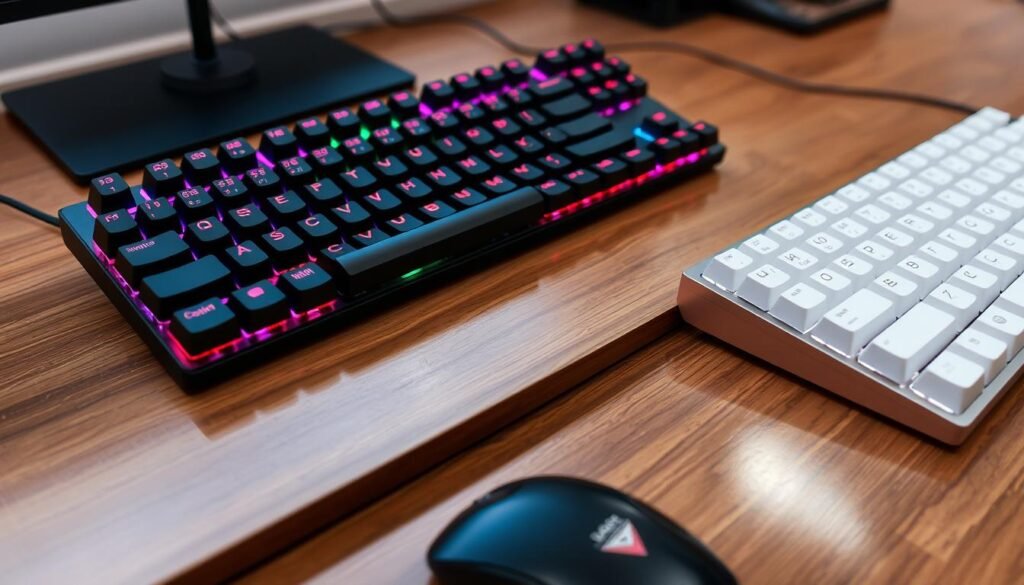
Mechanical Keyboards: A Typist’s Dream
Mechanical keyboards are a dream for typists. They offer a unique typing experience. This is thanks to the mechanical switches that power each keystroke.
The Magic of Mechanical Switches
Mechanical switches are key to mechanical keyboards. They give users tactile and audible feedback. This feedback is unmatched by membrane keyboards.
Each key press on a mechanical keyboard feels great. You get a click and a bump. This makes typing more precise and enjoyable.
But there’s more to mechanical switches. They are also very durable. Mechanical keyboards can last for years, even decades, with regular use.
- Tactile and audible feedback with each keystroke
- Exceptional durability and lifespan
- Precise and responsive typing experience
“I’ve been using my mechanical keyboard for over five years, and it still feels as good as the day I bought it. The typing experience is unbeatable.”
For those who love typing, mechanical keyboards are the best choice. They offer an unmatched typing experience and impressive durability. This makes them a standout in the world of input devices.
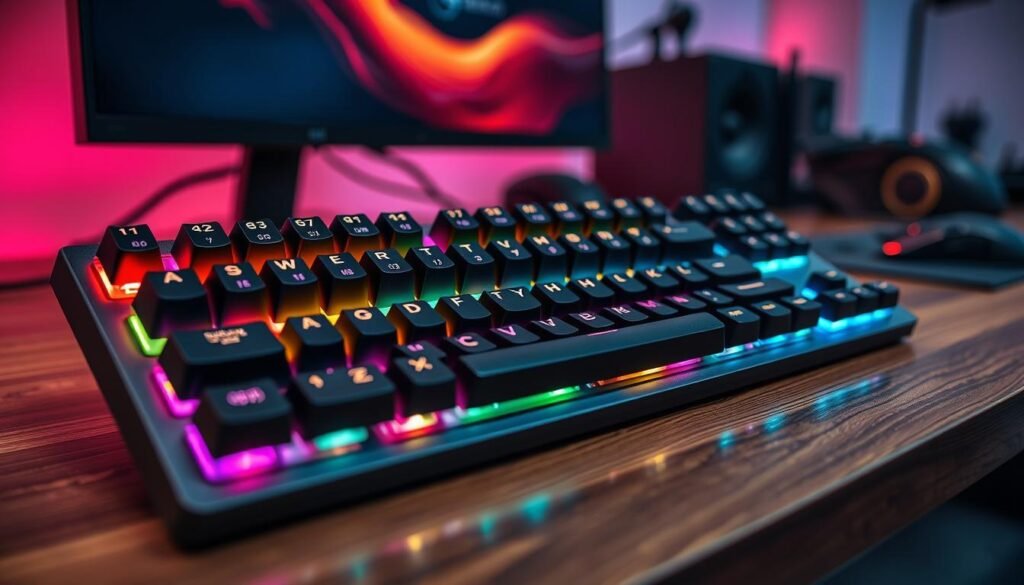
Membrane Keyboards: Simplicity and Affordability
Membrane keyboards are a budget-friendly option compared to mechanical keyboards. They offer a simple design that focuses on ease and cost. This makes them perfect for those who value affordability and simplicity.
One big plus of membrane keyboards is their price. They cost much less than mechanical keyboards. This makes quality typing tools more accessible to everyone. It lets more people enjoy a good typing experience without spending a lot.
Membrane keyboards are also easy to use. Their simple layout and few moving parts make typing smooth. This is great for casual users or anyone who likes a straightforward typing experience.
Even though they don’t have the same tactile feedback as mechanical keyboards, membrane keyboards still feel good to type on. Their switches may not be as noticeable, but they still offer a responsive feel. This is perfect for those who want a good typing experience without all the extra features.
Choosing between membrane and mechanical keyboards depends on what you need. Membrane keyboards are a great choice for those looking for simplicity, affordability, and a good typing experience. They offer a practical and cost-effective solution for many users.
| Feature | Membrane Keyboards | Mechanical Keyboards |
|---|---|---|
| Typing Experience | Relatively simple and straightforward | More advanced and customizable |
| Affordability | Generally more affordable | Typically more expensive |
| Durability | Moderate lifespan | Longer lifespan and durability |
| Noise Level | Quieter operation | Louder, more pronounced click/clack sounds |
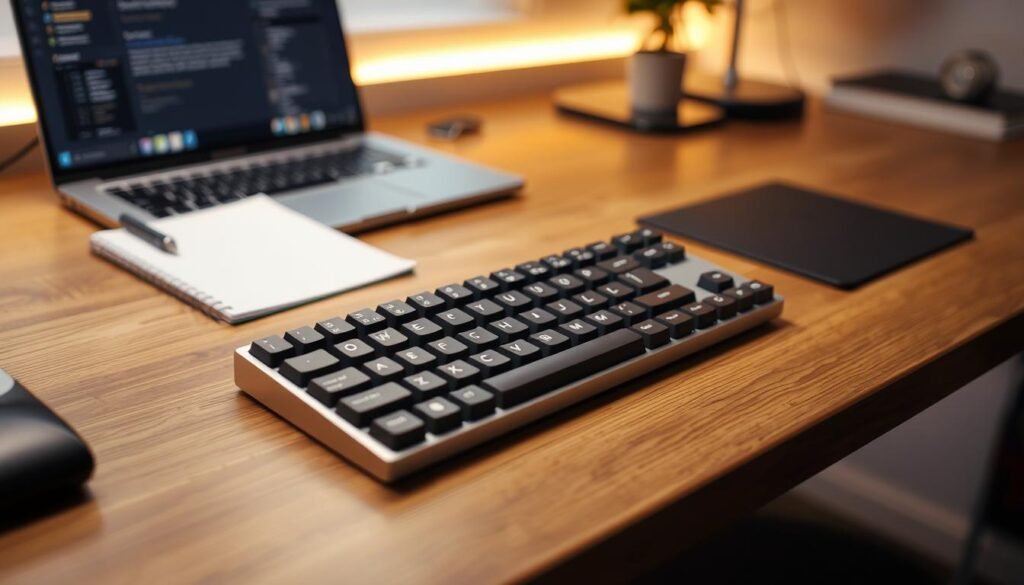
In the end, the choice between membrane and mechanical keyboards depends on your personal preferences and budget. Membrane keyboards are simple and affordable, while mechanical keyboards offer more features and customization. Think about what you need and what you can afford to find the best keyboard for you.
Mechanical vs membrane keyboards: Key Differences
When we look at keyboards, we see a big difference between mechanical and membrane ones. Each type meets different needs and tastes. Let’s dive into what makes them unique.
Typing Experience and Tactile Feedback
Mechanical keyboards stand out for their feel and sound. They give a clear and precise touch with each press. This is thanks to the mechanical switches under each key, which create a distinct sound or bump.
This feedback makes typing more enjoyable and can help you work better. It’s great for those who love the feel of mechanical keyboards.
Membrane keyboards, however, have a different feel. They use a thin rubber dome under each key. This can feel less clear and more soft. While they work well, they don’t offer the same feedback and feel as mechanical keyboards.
Durability and Lifespan
Mechanical keyboards are known for lasting a long time. Their switches can handle millions of presses. This means they last longer and work better over time.
Membrane keyboards, though cheaper, don’t last as long. Their rubber domes and membranes can wear out. This can make typing less smooth and less consistent.
If you need a keyboard that lasts, mechanical keyboards are the better choice. They’re built to last and are great for heavy users or gamers.
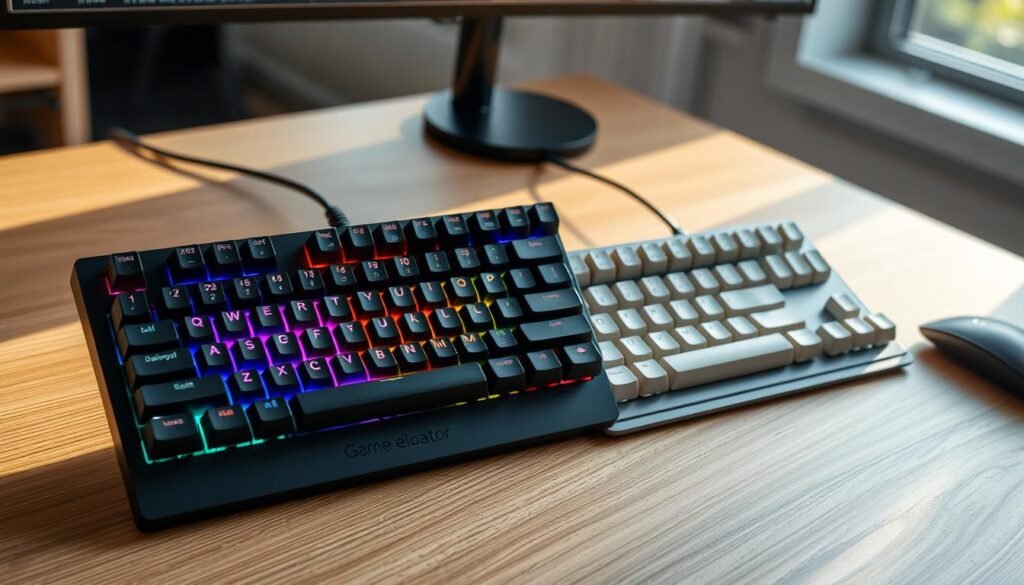
Exploring Mechanical Keyboard Switches
Choosing the right switch for your mechanical keyboard is key to a great typing experience. There are many types of switches, each with its own feel and function. Let’s look at linear, tactile, and clicky switches to see what makes them special.
Linear Switches: Smooth and Consistent
Linear switches are known for their smooth feel. When you press a key, it moves without any bumps or clicks. This makes them perfect for gamers who need quick and precise typing.
Tactile Switches: Satisfying Feedback
Tactile switches offer a clear feedback when pressed. You’ll feel a slight bump, which makes typing more satisfying. Writers and typists often choose these for the extra feedback they provide.
Clicky Switches: Audible Satisfaction
Clicky switches add an audible click to the tactile feedback. This makes typing feel more distinct and satisfying. However, they can be louder, so they’re not ideal for quiet spaces.
| Switch Type | Characteristics | Ideal Users |
|---|---|---|
| Linear | Smooth, consistent actuation without tactile feedback or audible clicks | Gamers, quiet typists |
| Tactile | Distinct tactile feedback with a “bump” during actuation, no audible click | Typists, writers |
| Clicky | Tactile feedback with an audible click during actuation | Enthusiasts, mechanical keyboard aficionados |
When picking a mechanical keyboard, think about what you need and where you’ll use it. Try out different switches to find the one that feels just right for you.
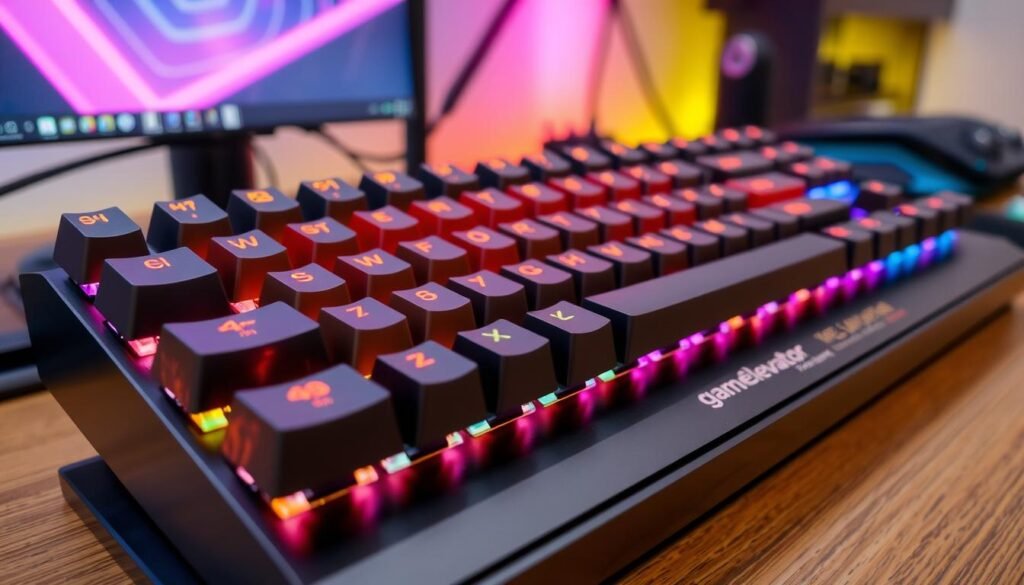
Keyboard Noise Levels: Quiet or Clicky?
Choosing a keyboard means thinking about the noise it makes. Do you like a quiet typing sound or the click of mechanical switches? Knowing the sound differences helps find the right keyboard for you.
The Soft Hush of Membrane Keyboards
Membrane keyboards, common in laptops and cheap desktops, are quiet. They have rubber switches that make a soft sound when pressed. This makes them great for those who want a quiet work space.
The Satisfying Clack of Mechanical Keyboards
On the other hand, mechanical keyboards are known for their loud sound. They have separate switches that make a clicky or tactile sound when pressed. The noise level changes with the switch type, like Cherry MX Blues for a louder click or Cherry MX Reds for a softer sound.
Finding Your Sweet Spot
Whether you like the quiet of membrane keyboards or the sound of mechanical switches, it’s up to you. It depends on your work setup, how much noise you can handle, and how you type. Think about these things to choose the right keyboard noise level for you.
“The sound of a mechanical keyboard can be a source of both joy and annoyance, depending on your perspective.”
In the end, picking between a quiet membrane keyboard and a louder mechanical one is about finding the right balance. It’s about what you like and what your work or gaming needs are.
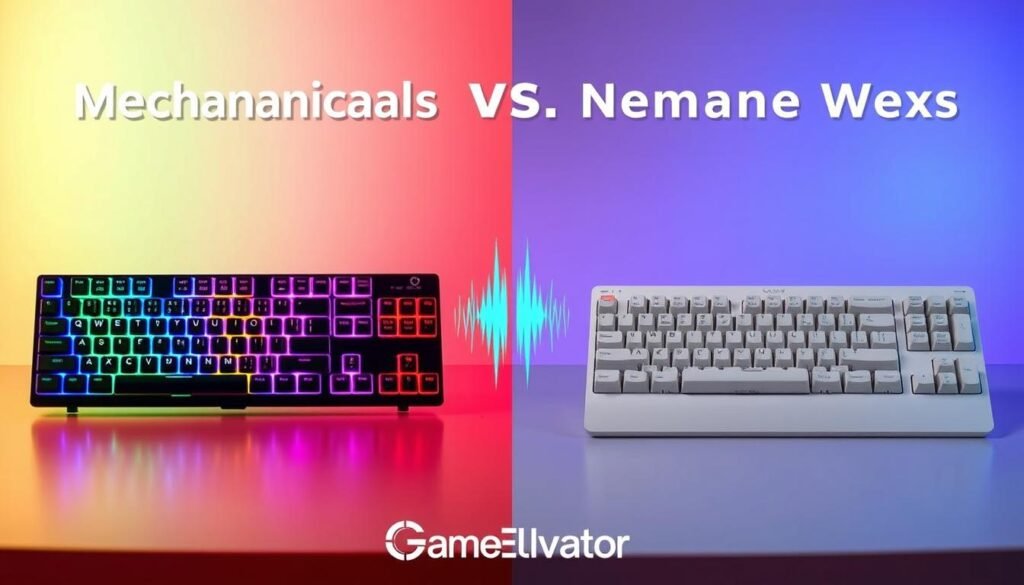
Mechanical keyboards for Gaming: Pros and Cons
The gaming world loves mechanical keyboards, but there’s a big debate about them. They’re popular, but there are good and bad points to think about. It’s important to know what works best for your gaming setup.
The Pros of Mechanical Keyboards for Gaming
- Responsiveness: Mechanical switches are quick and precise. This means faster reactions in games.
- Customization: You can change a lot on mechanical keyboards. This lets gamers make their setup just right for them.
- Durability: These keyboards last a long time. They can handle lots of gaming without getting worse.
The Cons of Mechanical Keyboards for Gaming
- Noise: Mechanical keyboards are often louder. This can be distracting during games or when others are around.
- Weight: They’re heavier than other keyboards. This might not be what gamers who like light setups want.
- Cost: Mechanical keyboards cost more. This can be a big deal for some gamers.
Choosing between mechanical and membrane keyboards depends on what you like and need. Mechanical keyboards have great points, but the noise and cost might not fit everyone’s needs.
| Feature | Mechanical Keyboards | Membrane Keyboards |
|---|---|---|
| Responsiveness | High | Moderate |
| Customization | Extensive | Limited |
| Durability | Excellent | Good |
| Noise Level | High | Low |
| Weight | Heavy | Light |
| Cost | High | Low |
“The fast response and satisfying click of a mechanical keyboard can give gamers a competitive edge, but the noise and cost may not be suitable for everyone.”
Ergonomics and Comfort: Which Keyboard Wins?
Ergonomics and comfort are key when typing for long periods. We’ll look at how mechanical and membrane keyboards compare in these areas.
Wrist Support and Key Travel Distance
Wrist support is a big deal for keyboard ergonomics. Mechanical keyboards have a deeper key travel, which helps keep wrists straight. This is better for your wrists than membrane keyboards, which have shorter keys.
The distance keys travel also matters. Mechanical keyboards offer a deeper, more satisfying feel. This makes typing more comfortable and accurate, especially for those who value ergonomics and comfort.
| Feature | Mechanical Keyboards | Membrane Keyboards |
|---|---|---|
| Wrist Support | Typically better wrist support due to the pronounced key travel distance | May provide less wrist support due to a shorter key travel distance |
| Key Travel Distance | Longer key travel distance, allowing for a more comfortable and precise typing experience | Shorter key travel distance, potentially less comfortable for extended typing sessions |
Choosing between mechanical and membrane keyboards depends on what you need. Think about ergonomics, comfort, wrist support, and key travel distance. This will help you pick the best keyboard for your work and typing style.
Maintenance and Cleaning: Keeping Your Keyboard Fresh
Keeping your keyboard in great shape is key, whether it’s mechanical or membrane. Regular care can make your keyboard last longer and work better.
Cleaning Your Keyboard
First, unplug or turn off your keyboard. Use a soft, dry cloth to wipe the surface gently. Focus on the keys. For deeper cleaning, use compressed air to remove dust and debris between the keys.
- Don’t use water or liquid cleaners, as they can harm the inside parts.
- Take out the keycaps and clean under them for a deeper clean.
- Use a small, soft-bristled brush to sweep away dust or crumbs.
Maintaining Mechanical Keyboards
Mechanical keyboards need more care than membrane ones. Here are some tips to keep your mechanical keyboard in great condition:
- Lubricate the switches often for smooth key presses.
- Clean the switches and keycaps regularly to avoid dust and grime buildup.
- Think about getting a keyboard dust cover or a protective case when not using it.
| Maintenance Task | Mechanical Keyboards | Membrane Keyboards |
|---|---|---|
| Lubrication | Recommended | Not Necessary |
| Keycap Removal | Recommended | Not Recommended |
| Compressed Air Cleaning | Recommended | Recommended |
By following these easy maintenance and cleaning tips, you can keep your keyboard in perfect condition. This ensures it will continue to offer a comfortable and reliable typing experience for many years.
Customization and Personalization Options
Mechanical keyboards let us customize our typing experience to fit our style. We can choose from many keycaps and backlighting options. This makes our keyboards truly unique.
Keycaps, Backlighting, and More
Keycaps are key to a mechanical keyboard’s look. We can pick from many designs, from simple to bold. Backlighting adds color and mood, making typing more fun.
We can also change the switches and adjust the feel of our keyboard. This lets us tailor it to our needs and style.
Whether you’re gaming, writing, or just enjoy customizing, mechanical keyboards have it all. They let us create a typing experience that’s truly our own.
“The ability to customize my mechanical keyboard has transformed my typing experience. I love being able to create a unique setup that reflects my personal style and preferences.”
| Customization Option | Description |
|---|---|
| Keycaps | A wide range of keycap designs, materials, and profiles to choose from, allowing for a personalized aesthetic. |
| Backlighting | Customizable RGB or single-color backlighting to set the mood and enhance the overall typing experience. |
| Mechanical switches | The ability to choose between different switch types (linear, tactile, or clicky) to suit individual preferences and needs. |
| Keyboard layout | Customization of the overall keyboard layout, including key placement and programming, to optimize workflow and productivity. |
Cost Considerations: Mechanical Keyboards vs Membrane Keyboards
Choosing a keyboard means looking at the cost. Mechanical and membrane keyboards have different prices. Knowing these differences helps you pick the right one for your budget and needs.
Mechanical keyboards cost more, from $50 to $200 or more. They are durable, responsive, and customizable. This makes them a favorite among enthusiasts and professionals.
Membrane keyboards are cheaper, priced from $10 to $50. They use a rubber dome system for keystrokes. While not as customizable, they still offer a good typing experience for casual users or those on a budget.
| Feature | Mechanical Keyboards | Membrane Keyboards |
|---|---|---|
| Typical Price Range | $50 to $200+ | $10 to $50 |
| Durability | High (50 million+ keystrokes) | Moderate (10-20 million keystrokes) |
| Customization | Extensive (keycaps, switches, etc.) | Limited |
| Typing Experience | Responsive, tactile, and satisfying | Adequate for casual use |
When choosing between mechanical and membrane keyboards, think about your budget and needs. Mechanical keyboards may cost more upfront. But their durability and performance might be worth it for many users.
Mechanical vs Membrane Keyboards: Which One Is Right for You?
Choosing between a mechanical or membrane keyboard can be tough. Both have their own benefits. It’s key to look closely at what each offers to find the best match for you.
Assessing Your Needs and Preferences
When picking a keyboard, think about a few things:
- Typing Experience: If you like a firm, tactile feel, mechanical keyboards are for you. Membrane keyboards are softer and quieter.
- Durability: Mechanical keyboards last a long time, with some switches lasting up to 50 million keystrokes. Membrane keyboards are cheaper but don’t last as long.
- Noise Level: Mechanical keyboards make a “clicky” sound, which some enjoy. Membrane keyboards are generally quieter.
- Customization: Mechanical keyboards let you customize a lot, like keycaps and backlighting. Membrane keyboards have fewer options.
By thinking about these points, you can decide if a mechanical vs membrane keyboard is better for you. This will help you get the best typing experience.
“The right keyboard can make a world of difference in your productivity and overall computing experience.”
In the end, your choice depends on what you like and need. Try out different keyboards and make a choice that fits your workflow best.
How to choose the best ergonomic gaming chair for your body type and needs
How to choose the best ergonomic gaming chair for your body type and needs
Conclusion
Exploring the differences between mechanical and membrane keyboards shows us each has its own strengths. Mechanical keyboards give a better typing feel, last longer, and can be customized a lot. They’re great for those who type a lot or play games a lot.
Membrane keyboards are simpler, cheaper, and quieter. They’re good for people who just need a basic keyboard or work in a shared space.
Choosing between a mechanical or membrane keyboard depends on what you need. If you want a better typing feel and can customize, go for a mechanical keyboard. But if you’re looking for something affordable and quiet, a membrane keyboard might be better.
We suggest trying out different keyboards to see what works best for you. This guide should help you make a smart choice. Find a keyboard that makes your work or play more enjoyable and comfortable.

